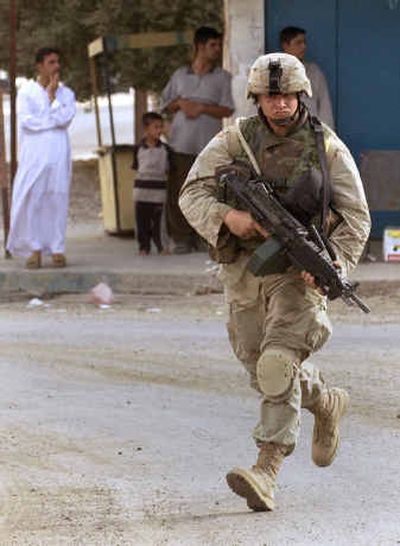Marines, Iraqis take bridge, suspects in Babil province

BAGHDAD, Iraq – More than 3,000 U.S. and Iraqi forces launched a major operation Tuesday against insurgent strongholds just south of Baghdad, their second mission in five days to wrest control from militants whose attacks threaten national elections seen as crucial to stabilizing this turbulent country.
The operation in Babil province – an area notorious for kidnappings and ambushes and home to the fabled, ancient city of Babylon – follows last week’s U.S.-Iraqi drive to oust insurgent forces from Samarra, about 60 miles north of Baghdad.
The 24th Marine Expeditionary Unit and Iraqi forces went into action after a string of bombings set off clashes Tuesday between U.S. troops and gunmen west of Baghdad and in the northern city of Mosul, and as the discovery of five beheaded bodies over two days indicated the pace of such grisly killings was also surging.
The Marines and Iraqis punched their way across the Euphrates River, rounded up 160 suspects, seized a suspected training camp and took control of a major bridge, the U.S. command said. The bridge, spanning the Euphrates, is believed to be a favored corridor linking insurgent areas around Baghdad, Fallujah and towns farther south.
The area in which they were operating was an estimated 40 to 45 miles northwest of ancient Babylon. The capital of Babil province is Hillah, about 65 miles south of Baghdad. The provincial capital sits near the Euphrates in a belt of rich agricultural land between that river and the nearby Tigris.
U.S. and Iraqi forces are trying to curb the mounting insurgency in order to hold national elections throughout the country in January. Some U.S. officials have expressed doubt that balloting will be possible in areas that have slipped from Iraqi government control.
Prime Minister Ayad Allawi said the tempo of attacks against insurgent strongholds would increase but acknowledged that the security challenge was a “source of worry.”
“I don’t want to deny the impact of security situation nor minimize the size of the challenges we face,” Allawi said during a speech Tuesday in Baghdad. “I believe that many of the Iraqi people agree with me that we should not let terrorist forces decide our agenda.”
“It’s true that the security situation in which the country is living commands most of your attention and maybe your questions too. It’s true that it is a source of worry to many who are concerned about Iraq’s future. But it’s better than surrendering to the evil forces or giving in to their demands.”
As part of the campaign, Allawi’s government has been negotiating with followers of renegade Shiite cleric Muqtada al-Sadr to halt weeks of fighting with U.S. troops in the Baghdad district of Sadr City. During his speech, Allawi said the two sides had reached the basis of a deal and talks were continuing.
However, clashes between al-Sadr’s militia and American troops continued despite the talks. Residents of the Shiite district reported hearing explosions Tuesday night.
U.S. troops also battled gunmen in an insurgent stronghold west of Baghdad and in Mosul after a series of bombings. At least five American soldiers were wounded – underscoring the role of homemade explosives as the insurgent weapon of choice in a country awash in military ordnance.
In Ramadi, about 70 miles west of Baghdad, American troops and insurgents exchanged gunfire after a car bomb exploded, police Capt. Nassir Hassan said.
Later, a roadside bomb detonated as a U.S. military convoy was passing near the Grand Mosque in the eastern section of Ramadi, wounding one soldier, said Marine spokesman 1st Lt. Lyle Gilbert. He said seven Iraqis were wounded.
However, Dr. Diaa al-Haity at Ramadi General Hospital said four Iraqis were killed and two wounded.
In Mosul, Iraq’s third largest city and the major metropolis of the north, a car bomb targeted a U.S. convoy at a traffic circle, wounding four American soldiers, said Capt. Angela Bowman, a military spokeswoman. After the explosion, insurgents fired a rocket-propelled grenade at the convoy, which returned fire, she said. Three Iraqi civilians were killed, police and the U.S. military said. At least three others were wounded, according to a nearby hospital.
A third car bomb exploded as the Iraqi National Guard was conducting raids in Youssifiyah, 12 miles south of the capital, said police Lt. Abbas Shechati. One Iraqi civilian was killed and 13 Iraqis were wounded, nine of them National Guardsmen, he said.
Near Baghdad, one soldier from the U.S. Army’s 13th Corps Support Command was killed and two were wounded when their convoy hit a roadside bomb late Monday, the military said.